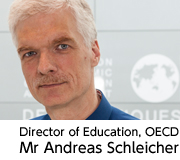- Home
- Launch of TALIS 2013 Results
~ improving working conditions of teachers and securing quality education for children through social dialogue
ABOUT JTU
Launch of TALIS 2013 Results
~ improving working conditions of teachers and securing quality education for children through social dialogue
2014/06/29
Organization for Economic Co-operation and Development (OECD) released the results of Teaching and Leaning International Survey (TALIS) on June 25, 2014.
It was first time for Japan to join the survey, which is the largest international one. Japan Teachers’ Union (JTU) has welcomed it and made the statement (below) and the press conference with Education International (EI). Also, we exchanged views on TALIS with Mr Andreas Schleicher, Director of Education, OECD.

Mr Schleicher presented on the results of TALIS 2013 "How to best shape teacher policies?". He briefly introduced the concepts and aims of the survey, and pointed out the particular results to Japan; teacher’s self-efficacy level is lower than the average, teachers’ do not have enough opportunities for professional development though they eager to, and teachers’ workload is much more than the average especially for extracurricular activities.
Following the presentation, Mr Schleicher and Mr Kato, President of JTU, exchanged views on teaching profession and improvement of Japanese education. Mr Kato mentioned "It is one of the biggest goal for JTU to achieve inclusive education which accept needs of individual children. Teachers want to spare more time to cope with each child, which means we need to downsize class-size and increase the number of teachers".

At the press conference, Mr John Bangs, senior consultant of EI, made some remarks on TALIS 2013. He stressed that it was important for policy-makers not to impose educational policies without social dialogue with teachers unions. Mr Okajima, Deputy General Secretary of JTU, acknowledged that joining TALIS was the significant opportunity to pursue quality education and improve working conditions of teachers.
TALIS 2013 showed the realities in schools. JTU will continue to commit ourselves in social dialogue as representative of educational professions to improve working conditions of teachers and secure quality education for children.
Educational Issues in Japan Suggested by TALIS
Japan Teachers’ Union
25 June, 2014
◇On Participation on TALIS
Japan did not join TALIS 2008 and JTU made comments on the meaning of Japan’s participation on TALIS at OECD-TUAC Working Group on Education meetings, and Education International (EI) conferences and executive boards meetings.
Programme for International Student Assessment (PISA) results suggest international issues on students achievement. Therefore, we believe that it is important to link the results with domestic educational policies and situations rather than to be glad and sad at the rankings or scores.
We hope that the international comparison on teachers working conditions and learning environments show evidence of challenges and issues at schools and bring development and improvement of concrete educational conditions in Japan.
1. On questions to principals
To the question on reasons which "limit your effectiveness as a principal", "inadequate school budget and resource (84.2%)" and "government regulation and policy (64.8%)" were replied.
"Inadequate school budgets and resources" mean that principals think the lack of enough teachers is one of them and it is necessary to increase the number of teachers so that they face difficulties to cope with realities and various children’s needs in communities.
"Government regulations and policies" should show that principals are concerned with recent top-down policy-makings with political initiatives such as renewal of curriculums, teachers license systems and national standardized tests, which are opposite to bottom up ones with reflecting teachers voices.
The top-down policies do not fully recognize school needs in what teachers want to do, and sometimes are developed without adequate additional personnel. It means that there are more loads for teachers and children, and principals also have this view.
2. Professional development of teachers
Teachers needs for professional development is higher than the other participant countries. More than 50% reply "knowledge and understanding of my subject field(s)" and "pedagogical competencies in teaching my subject field(s)," and higher percentage on other items.
On the other hand, there are numerous voices of "professional development is too expensive/unaffordable" and "professional development conflicts with work schedule." It shows evidence that teachers cannot attend opportunities for professional development though they want to since they do not have enough time and inclinations as paragraph 4 will make clear that teachers are on the run.
It is required to consider how professional developments should be and arrange conditions such as establishing opportunities to match teachers needs and improving teachers daily working conditions.
3. Appraisal and feedback to teachers
At schools, teachers actively watch others’ teaching in classrooms to improve their own. It is important activity so that teachers learn each other and develop skills and professionality.
Education is to grow children’s ability and achieve full personalities. Therefore, it is difficult to choose standards when teachers are appraised. If teachers appraisal is linked to salary, it is inevitable to establish a system with consideration on those peculiarities of schools. JTU insists that the system should have 5 principles (equitability, transparency, objectiveness and suitability with objectives) and 2 requirements (labor-management consultation and complaint processing measure).
4. Time allocation of teachers work
Class hours are not very different from other countries, but teachers working time is longest (53.9 hours) among the participating countries (average 38.3 hours). The factors are that they spend long for instructions of discipline, course, coming and going to school, and lunch. More teachers and smaller class size are needed.
"Time allocated for instructions out of curriculum" are triple as long as the average. That is club activities after school. National curriculum refers them as one of school education which should be paid enough attention to make links with other teaching contents though the activities are not included in the range of the curriculum. We believe that it is only Japan where teachers work for the instructions out of curriculum. It is an inevitable challenge to cover in the gap between the reality and the concerned regulations. Club activities could be discussed to treat it as not school education but social activities.
5. Self-efficacy of teachers and satisfaction at work
Self-efficacy of teachers is quite low comparing with other participating countries in the every terms related to encouragement of active learning participation of students. On the contrary, more than 90% of teachers reply that active learning of students is important in the term of individual "belief on teaching and learning".
According to the JTU’s survey, there have been voices from teachers saying "not affording to cope individually and closely with students because of time restriction," or "not having enough time to study teaching materials and prepare for classesi". At the same time, they recognize the importance of active learning of children. It results in that teachers feel gaps between the reality and the need for individual supports for children, and cannot feel self-efficacy. Teaching conditions should be improved including more teachers and smaller class sizes.
To the question on satisfaction over job, the reply "all in all, I am satisfied with my job." is 85.1% in Japan (the average 91.2%), the reply "I am satisfied with my performance in this school." 50.5% (the average 92.6%), and the reply "If I could decide again, I would still choose to work as a teacher." 58.1% which is below the average of 77.6%.
By the JTU survey, it is clear that teachers feel "there are wide gaps between the reality and my ideals." though they feel rewarding and have much motivation. It should be analyzed as challenges to overcome in Japan.


